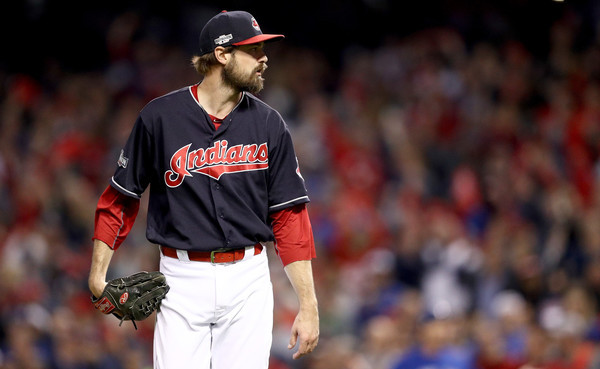
Later tonight, the easy to love Indians will look to take a commanding three games to none lead in the ALCS. They held the Blue Jays to one run total in Games One and Two over the weekend. A big reason why: Andrew Miller. He’s struck out ten and allowed just one hit in 3.2 innings. So far this postseason he’s fanned 17 in 7.2 scoreless innings. Total domination.
The most impressive thing about Miller’s postseason is not necessarily his strikeout total, I don’t think, though it’s obviously fantastic. It’s the workload. He’s recorded at least five outs in each of his four appearances, plus Indians skipper Terry Francona has used Miller against the middle of the other team’s lineup. He’s not just dominating. He’s dominating the other team’s best hitters.
With Miller being basically the perfect relief pitcher this postseason, it’s only natural to wonder whether the Yankees made a mistake by trading him at the deadline. After all, he was under contract for another two seasons, so while he wouldn’t be doing this for New York this October, there was always next year and the year after. The Yankees traded not only an elite player, but pretty much the ideal team player, for prospects. Prospects!
The other night on the postgame show Pete Rose called the Miller trade a huge mistake, and, well, he’s Pete Rose, the all-time hit king, so clearly everything he says it correct. I don’t see it that way though. Sure, ultimately the Miller trade could turn out to be a massive mistake, but we are a very long way from knowing that for sure. The best way to judge this trade right now is using the information we had at the time, which is:
1. The Yankees were long shots. The Yankees did make a spirited run in August and early-September, but on the day of the Miller trade, they had just lost three straight and were 4.5 games back of the second wildcard spot with four teams ahead of them. There was no indication whatsoever the team would make a run to the postseason, and ultimately, they fell way short of a playoff spot. Miller wasn’t making up the five-game deficit by himself.
2. The bullpen market was nuts. One week prior to the Miller trade, the Yankees dealt Aroldis Chapman to the Cubs for one great prospect (Gleyber Torres) and three other solid pieces. That’s a tremendous haul for a rental reliever, even one as good as Chapman. Two years ago the Red Sox got one good prospect for rental Miller. The Yankees traded Miller at a time when the demand for relievers was at an all-time high. It’s simple supply and demand. The demand was high and the Yankees had the only supply. They cashed in big time.

3. The return was widely praised. The Yankees received a top 25 prospect (Clint Frazier), a second top 100 prospect (Justus Sheffield), and two others (Ben Heller, J.P. Feyereisen) for Miller, and the consensus was they made a fantastic trade. Keith Law (subs. req’d) said the Yankees “have done extremely well.” One executive told Jayson Stark the team “did the right thing.” Buster Olney called it a “strong haul.” Try to find a negative reaction to the trade at the time it was made. I’ll wait. There wasn’t even the token “big mistake” quote from an anonymous scout.
4. The Yankees badly need young talent. The Yankees are old. They’re getting younger now, but generally speaking, they had a very veteran team this past season. The need for an infusion of young talent has been obvious for a while, and while guys like Gary Sanchez and Aaron Judge were knocking on the door at midseason, the Yankees still needed more pieces. They weren’t a “one or two young players away from contention” team. The trade brought in the high-end talent the Yankees need to build the core of the next winning team.
In the short-term, the trade has done nothing for the Yankees other than boost their farm system ranking. Heller’s thrown a few innings in the big leagues, but nothing meaningful. For the Indians, this trade has had enormous impact in the short-term, which is what they expected. They traded for Miller because they want to win the World Series for the first time since 1948. This was an all-in move, the kind of all-in move small payroll teams rarely make.
This is a trade we won’t be able to evaluate for years from the Yankees’ perspective. And I might be a total dud when it’s all said and done. Who knows? Finding out is part of the fun. Miller’s immediate success — no one is surprised by this, right? he’s been awesome for a while now — doesn’t make the trade a mistake any more than immediate failure would have made the trade a steal. All the years of control involved make this a long-term evaluation.
“I want the teams that stepped up and made those trades to be rewarded for doing so. It would justify the action they took,” said Brian Cashman to John Harper. “I have absolutely no regrets about the deals we made — other than being in the position we were in. We did what we had to do, and hopefully everybody wins.”
Leave a Reply
You must be logged in to post a comment.